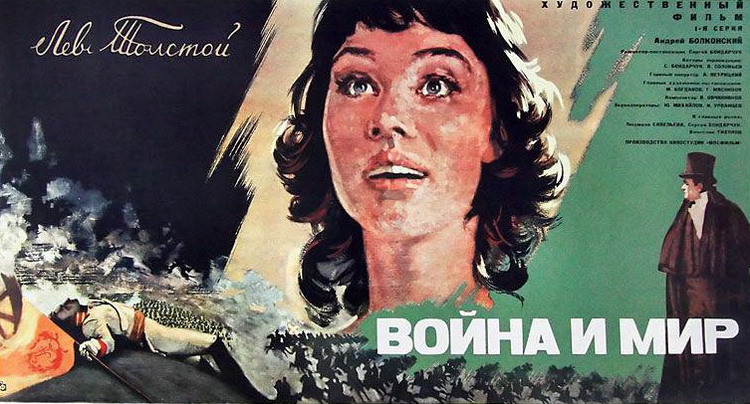There’s an old axiom that mediocre books make great movies and great books make for lousy movies. Mario Puzo’s bestseller The Godfather is a straightforward potboiler but Francis Ford Coppola spun it into one of the best films ever made. In contrast, F. Scott Fitzgerald’s The Great Gatsby has beguiled multiple ambitious, misguided filmmakers into making cinematic duds.
Hollywood’s 1956 adaptation of Leo Tolstoy’s famously massive tome War and Peace proved that axiom to be true. Director King Vidor, who generally speaking is no slouch when it comes to directing epics, just couldn’t translate the novel’s sweep and depth. Moreover, the film’s leads, Audrey Hepburn and Henry Fonda, just seemed miscast. New York Times critic Bosley Crowther described the movie as “oddly mechanical and emotionally sterile.”
The movie was also an affront to Russian nationalism. After all, Tolstoy’s novel is not just another historical epic; it is a cultural lodestone for what is “Russian-ness.” It is, as Rosemary Edmonds, a translator of the 1963 edition of the book called, the “Iliad and the Odyssey of Russia.” The Soviet film industry couldn’t let some half-baked Hollywood flick end up being the sole cinematic adaptation of the book. Making an adaptation was, as a bunch of Soviet filmmakers wrote in an open letter, “a matter of honor for the Soviet cinema industry.”
After decades of making stolid propaganda pieces that more often than not involved tractors, the Soviet film industry was fired up to make a work that was faithful to Tolstoy and yet have artistic merit as a movie – a tall order. As the director and star of the Russian version of War and Peace, Sergei Bondarchuk, put it: “Our duty is to introduce the future viewer to the origins of sublime art, to make the innermost mysteries of the novel, War and Peace, visually tangible, to inform a feeling of fullness of life, of the joy of human experience.”
The Soviet government marshaled a staggering amount of effort and expense to realize this film. Never underestimate the will of a totalitarian dictatorship with an axe to grind. Production started in 1961 and lasted six years. More than forty different museums contributed costumes and set dressing to the production, including things like chandeliers, silverware and furniture. The Department of Agriculture contributed 900 horses. The Red Army had 12,000 troops play as extras during the climactic Battle of Borodino sequence. Bondarchuk suffered two near-fatal heart attacks during production.
All that money and effort paid off. The resulting movie was one of the most lavish, spectacular films ever made. And at 451 minutes, it’s also one of the longest. (It was released in the USSR as four separate movies.)
Along the way, Bondarchuk pulled off the impossible – the movie is actually good, mirroring the breadth and depth of the novel. War and Peace won all sorts of awards including an Oscar for Best Foreign language movie. As a young Roger Ebert raved back in 1969:
“War and Peace” is the definitive epic of all time. It is hard to imagine that circumstances will ever again combine to make a more spectacular, expensive, and — yes — splendid movie. Perhaps that’s just as well; epics seem to be going out of favor, replaced instead by smaller, more personal films. Perhaps this greatest of the epics will be one of the last, bringing the epic form to its ultimate statement and at the same time supplying the epitaph.
You can watch the film above, thanks to Mosfilm. It comes complete with subtitles.
Bondarchuk’s War and Peace, which you can also purchase online, is listed in our collection, 4,000+ Free Movies Online: Great Classics, Indies, Noir, Westerns, Documentaries & More.
Related Content:
Rare Recording: Leo Tolstoy Reads From His Last Major Work in Four Languages, 1909
Vintage Footage of Leo Tolstoy: Video Captures the Great Novelist During His Final Days
Leo Tolstoy’s Family Recipe for Macaroni and Cheese
Jonathan Crow is a Los Angeles-based writer and filmmaker whose work has appeared in Yahoo!, The Hollywood Reporter, and other publications. You can follow him at @jonccrow. And check out his blog Veeptopus, featuring pictures of vice presidents with octopuses on their heads. The Veeptopus store is here.



la politique est une mère qui a tuer son fils au nom de la politique plusieurs crimes de guerres on étaient commises plusieurs riches sont devenue pauvres plusieurs histoires d’amoures ont échouaient plusieurs honnêtes gents sont humilier plusieurs pays sont déchirés par la fin orsent que tous le monde veut garent ire l’avenir de ces enfants enfin dieu nous a pas crayer pour avoir de bonne relation et de s’aimaient
there’s no subtitles unfortunately
There ARE NO SUBTITLES!!!!
seulement. il voulais que on s’accroche les uns au autres pour connaitre la valeur de notre vie sur terre et prendre soins des deux et toute est possible et quand en veut on peut et ce n’est jamais la guerre qui ressouderas nos problèmes ces bien la pais en utilisent l’amoure et la conscience et on doit ce dire comment les gens prendraient t’ils notre mort quelle seras notre réputation quoique nous soyons musellements c retiens ou bien juives hommes ou femmes riches ou pauvres même chose pour la différence de couleurs la perfection est impossibles mais en peut toujours essayer et il ya toujours de l’espoir quand en veut bien faire et comme il se dit le hasard fait bien des choses il suffis que nous ayons tous un bon grand ceaur.
Youtube links are broken
None of the links in this thread, with or without subtitles, work. They are all broken or page not found. Is ‘openculture.com’ some kind of hoax??